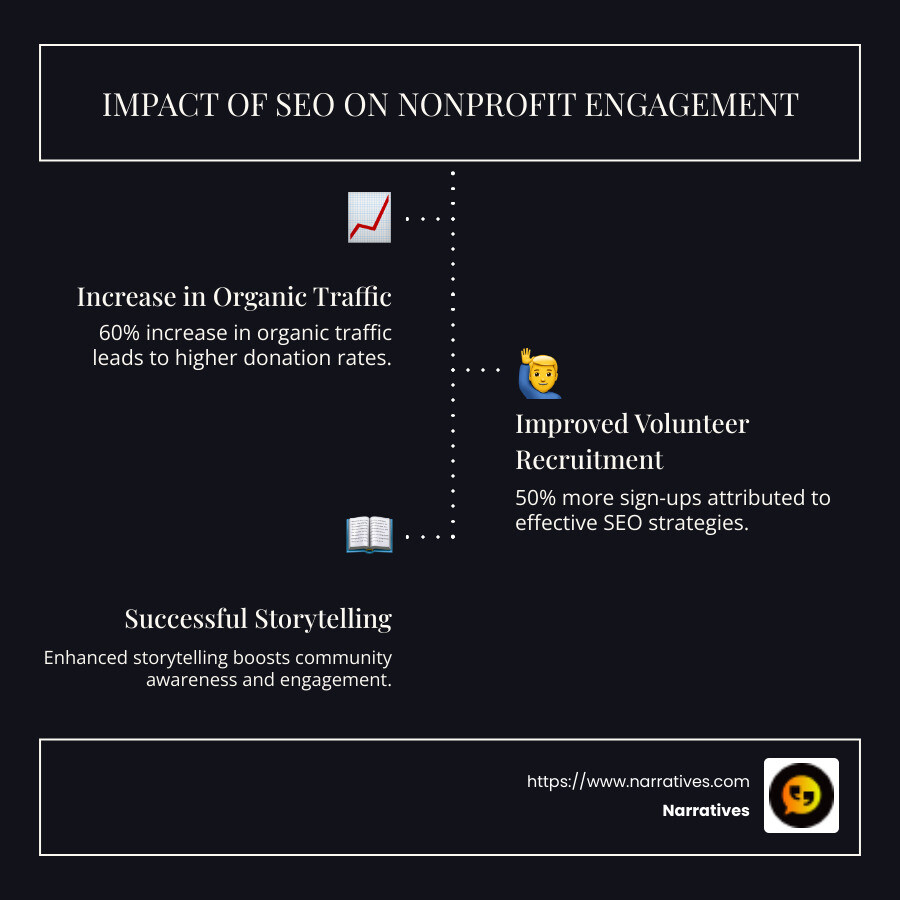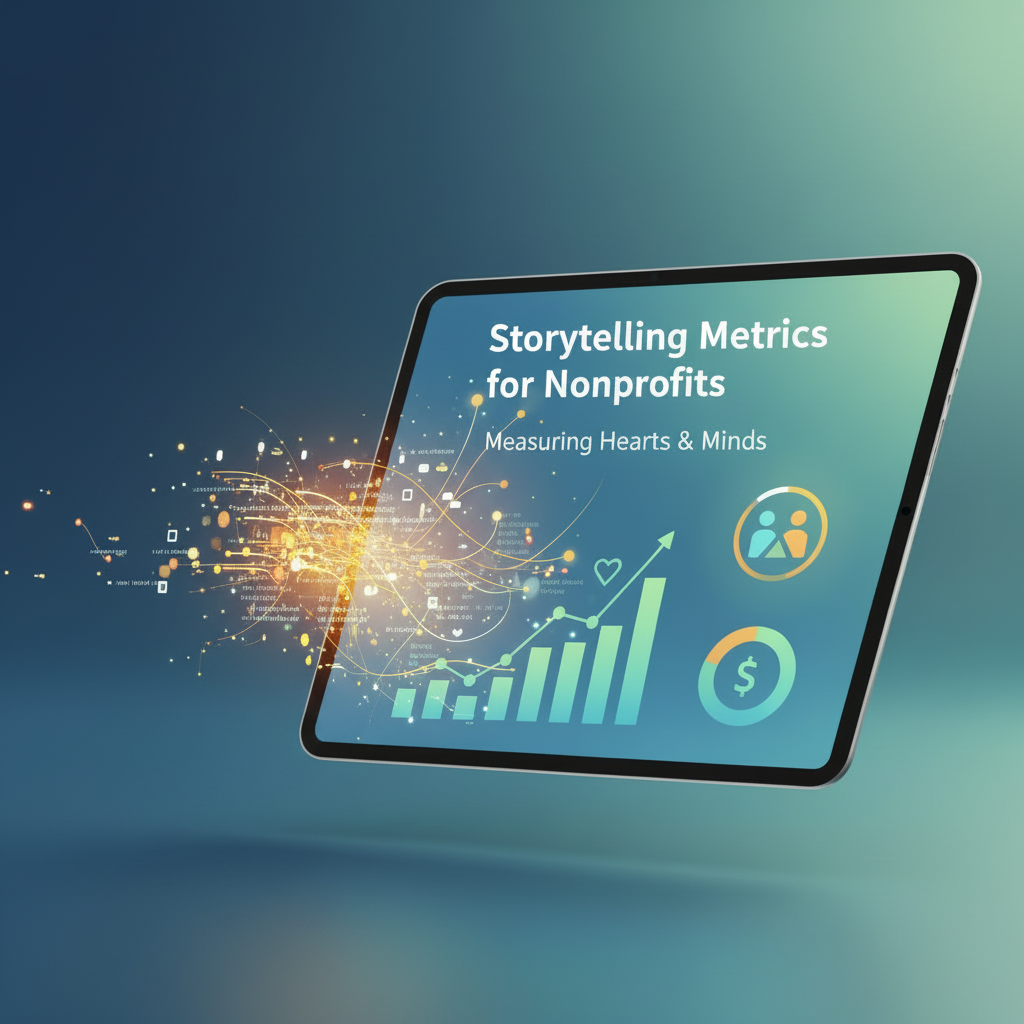SEO Strategies to Elevate Your Nonprofit's Impact

SEO's Role in Boosting Nonprofit Visibility
SEO for non-profit organizations is crucial for enhancing their online presence and reaching a broader audience. It's imperative for nonprofits to appear prominently in search results to connect with volunteers, donors, and supporters. The stakes are high: more visibility can mean more organic traffic, which in turn can lead to increased awareness, greater volunteer participation, and higher donation levels.
Here's a quick look at why SEO matters for nonprofits:
- Increase Organic Traffic: Attract visitors without the need for costly paid ads.
- Spread Awareness: Share your mission and goals with a larger audience.
- Boost Trust and Engagement: Provide valuable content that resonates with potential supporters at their time of need.
Incorporating SEO not only improves reach but can be a more sustainable marketing strategy compared to traditional advertising. Building trust through content that meets the needs of your audience is key.

Understanding SEO for Non-Profit Organizations
Search engine optimization (SEO) is the practice of improving your website so it ranks higher in search engine results. For nonprofits, this means making sure your website is easy to find when people search for topics related to your mission.
SEO Basics
At its core, SEO involves several key components:
Keyword Research: Finding what words people use when searching for topics related to your nonprofit. For example, if your nonprofit is focused on environmental conservation, keywords like "local conservation efforts" or "wildlife protection programs" might be relevant.
On-Page Optimization: This includes using the right keywords in your website's content, titles, and headings. It also involves ensuring that your website is user-friendly and loads quickly.
Technical SEO: Ensuring that search engines can easily crawl and index your website. This involves things like having a clear site structure and using proper tags.
Nonprofit SEO
For nonprofits, SEO is not just about attracting any visitor—it's about reaching those who are interested in your cause. Whether you're looking to recruit volunteers or attract donors, SEO for non-profit organizations can help you connect with the right audience.

Why focus on nonprofit SEO?
Cost-Effective: Unlike paid ads, organic traffic doesn't cost you money every time someone clicks on your link.
Builds Trust: Providing helpful, relevant content builds trust with your audience. When people find answers to their questions on your site, they are more likely to support your cause.
Long-Term Benefits: Unlike ads that stop bringing traffic once you stop paying, good SEO continues to bring visitors over time.
Putting It All Together
To succeed in SEO for non-profit organizations, you need to focus on creating valuable content that answers the questions your audience is asking. This involves understanding what your audience is searching for, optimizing your website to meet those needs, and ensuring your site is technically sound.
By prioritizing these SEO basics, your nonprofit can improve its visibility, engage more supporters, and ultimately make a greater impact.
Essential SEO Strategies for Nonprofits
To lift your nonprofit's impact, you need a solid SEO strategy. Let's explore key areas that can help your organization thrive online.
Local SEO
Local SEO is crucial for nonprofits that serve specific communities. By optimizing your online presence for local searches, you can connect with people who are nearby and interested in your cause.
Google Business Profile: Start by setting up a Google Business Profile. This ensures your nonprofit appears in local search results and on Google Maps.
Local Directories: Get listed in local directories. This boosts your visibility and helps people find you.
Reviews: Encourage reviews from volunteers and donors. Positive reviews build trust and improve your local SEO.
Search Intent
Understanding search intent is about knowing why people search for certain terms. Are they looking for information, wanting to make a donation, or seeking volunteer opportunities?
Informational Intent: Create content that answers common questions related to your mission.
Transactional Intent: Optimize donation pages for those ready to contribute.
Navigational Intent: Ensure your site is easy to steer for those who know what they're looking for.
Keyword Research
Keyword research is the backbone of any SEO strategy. It involves finding the words and phrases people use to search for topics related to your nonprofit.
Broad Terms: Start with general terms related to your cause.
Long-Tail Keywords: Focus on specific phrases that reflect your nonprofit’s unique offerings. These are often easier to rank for and attract more targeted traffic.
On-Page Optimization
On-page optimization ensures your website is user-friendly and search-engine-friendly.
Content: Use relevant keywords naturally in your content. Make sure it's engaging and informative.
Titles and Headings: Use clear, descriptive titles and headings that include your keywords.
Meta Descriptions: Write compelling meta descriptions that encourage clicks from search results.
Technical SEO
Technical SEO ensures that search engines can easily crawl and index your site.
Site Structure: Have a clear and logical site structure. This helps both users and search engines steer your site.
Mobile Optimization: Ensure your site is mobile-friendly. Many users will access your site from their phones.
Page Speed: Fast-loading pages improve user experience and search rankings.
By focusing on these essential SEO strategies, your nonprofit can increase its online visibility and connect with more supporters. Up next, we'll explore the top factors influencing SEO for nonprofits.
Top Factors Influencing SEO for Nonprofits
To make your nonprofit website stand out, understand the key factors that influence SEO for non-profit organizations. Let's explore these elements and how they can improve your online presence.
Page Speed
Page speed is crucial. When your website loads quickly, users are more likely to stay and explore. Google considers page speed a ranking factor, so faster sites often rank higher. Use tools like Google’s PageSpeed Insights to check your site's speed and make improvements.
- Compress Images: Large images can slow down your site. Compress them to improve load times.
- Leverage Caching: Store copies of your site's pages to serve users faster.
Mobile Usability
With more people accessing websites on their phones, mobile usability cannot be ignored. Google uses mobile-first indexing, meaning it primarily uses the mobile version of your site for ranking.
- Responsive Design: Ensure your site looks good on all devices. A responsive design adapts to different screen sizes.
- Avoid Flash: Flash content isn't supported on many mobile devices. Stick to HTML5 for better compatibility.
Backlinks
Backlinks are links from other websites to yours. They act as votes of confidence and can improve your site's authority and ranking.
- High-Quality Backlinks: Focus on getting links from reputable sites. These carry more weight with search engines.
- Outreach: Reach out to relevant organizations and ask them to link to your content.

User Experience
A positive user experience keeps visitors on your site longer and reduces bounce rates. Search engines notice this and may reward you with better rankings.
- Easy Navigation: Make sure users can find what they're looking for quickly.
- Engaging Content: Keep your audience interested with engaging and relevant content.
Content Quality
High-quality content is the backbone of any successful SEO strategy. It attracts visitors and encourages them to stay, explore, and return.
- Informative and Relevant: Provide valuable information that answers users' questions.
- Regular Updates: Keep content fresh and up-to-date to maintain interest and relevance.
By focusing on these factors, your nonprofit can improve its search engine rankings, attract more visitors, and ultimately make a greater impact. Next, we'll dive into practical tips to further improve your nonprofit's SEO.
Practical Tips to Improve Nonprofit SEO
Improving SEO for non-profit organizations involves several practical strategies. Let's explore some key tips that can lift your nonprofit’s online visibility and impact.
Content Creation
Creating high-quality content is essential. It not only attracts visitors but also keeps them engaged. Here’s how you can make your content stand out:
- Tell Stories: Share the stories of those you help. This creates an emotional connection and encourages sharing.
- Use Keywords Wisely: Incorporate relevant keywords naturally into your content. Avoid keyword stuffing, which can harm your SEO.
- Diversify Content: Use a mix of blog posts, videos, and infographics. Different formats cater to different preferences and can reach a wider audience.
Link Building
Backlinks are like votes of confidence from other websites. They can significantly boost your SEO.
- Collaborate with Partners: Work with other nonprofits or organizations to exchange links. This can be mutually beneficial.
- Create Link-Worthy Content: Produce valuable content that others want to link to. Guides, research reports, and case studies are great options.
- Monitor Mentions: Use tools to find unlinked mentions of your nonprofit and request a link back to your site.
Mobile Optimization
With many users browsing on mobile devices, ensuring your site is mobile-friendly is crucial.
- Responsive Design: Your website should adapt to different screen sizes and orientations. This improves user experience and helps with mobile-first indexing.
- Fast Loading Times: Optimize images and use efficient coding to ensure quick load times on mobile devices.
Social Signals
While not a direct ranking factor, social signals can influence your SEO indirectly.
- Engage on Social Media: Share your content on platforms like Facebook, Twitter, and Instagram. This increases visibility and can drive traffic to your site.
- Encourage Sharing: Add social sharing buttons to your content. Make it easy for users to share your stories and increase your reach.
User Engagement
Keeping users engaged on your site can improve your SEO by reducing bounce rates and increasing dwell time.
- Interactive Elements: Use quizzes, polls, or comment sections to encourage interaction.
- Clear Calls-to-Action: Guide visitors on what to do next, whether it’s signing up for a newsletter or making a donation.
By implementing these tips, your nonprofit can improve its online presence, attract more visitors, and ultimately achieve greater impact. Up next, we'll address some common questions about SEO for nonprofits.
Frequently Asked Questions about SEO for Nonprofits
What is SEO for Non-Profit Organizations?
Search Engine Optimization (SEO) is the practice of improving your website to increase its visibility in search engine results. For non-profit organizations, this means attracting more people who are interested in your cause without paying for ads. SEO is crucial because it helps potential donors, volunteers, and those needing your services find you more easily.
Imagine someone searching for "local charities near me." If your nonprofit's website is optimized, it’s more likely to appear in the search results, leading more people to find your organization.
How Can Nonprofits Improve Their SEO?
Improving SEO for non-profit organizations involves several strategies:
Keyword Research: Identify the terms your audience uses to find services like yours. Use tools like Semrush to find relevant keywords with lower competition.
On-Page Optimization: Ensure your website content is well-organized and uses keywords naturally. This includes optimizing titles, headers, and meta descriptions to match search intent.
Technical SEO: Make sure your website is easy for search engines to crawl. This includes having a secure (HTTPS) site, fast page loading speeds, and a mobile-friendly design.
Backlinks: Collaborate with other organizations to get high-quality backlinks. These are links from other reputable websites to your own, which help improve your site's authority.
Content Quality: Regularly publish high-quality content that educates and engages your audience. This can include blog posts, videos, and infographics.
Why is SEO Important for Nonprofits?
SEO is vital for nonprofits because it improves their visibility online. When your website ranks higher in search results, more people can find and learn about your cause. This increased visibility can lead to more donations and greater community support.
For example, studies show that 70% of users prefer organic search results over paid ads. This means people trust and are more likely to engage with your nonprofit if they find it through organic search results.
Additionally, SEO builds trust and credibility. By providing valuable and relevant content, you establish your nonprofit as a trusted source of information. This can lead to increased donor engagement and support for your mission.
By understanding and implementing effective SEO strategies, nonprofits can significantly boost their online presence and impact.
Conclusion
SEO for non-profit organizations is not just a nice-to-have; it's essential. At Narratives, we understand this necessity, and our mission is to help nonprofits lift their impact through strategic digital storytelling. By focusing on SEO, we can ensure that your stories reach those who need to hear them the most—potential donors, volunteers, and advocates.
Digital storytelling is a powerful tool. It allows nonprofits to share their mission in a way that resonates and inspires action. By optimizing your content for search engines, you increase the chances of your story being heard. This means more visibility, more engagement, and ultimately, more support for your cause.
Nonprofit partnerships are at the heart of what we do. We believe in the power of collaboration to amplify voices and drive social change. By working together, we can create high-quality, emotionally resonant content that not only tells your story but also improves your search engine rankings.
Our strategy at Narratives is to establish domain authority by focusing on underused storytelling-related keywords. This approach helps differentiate your nonprofit from others and positions you as a leader in your field. By investing in long-tail, high-intent, and location-specific keywords, we build consistent, organic traffic that supports inbound lead generation and improves brand awareness.
If you're ready to take your nonprofit's impact to the next level, consider partnering with us. Learn more about how we can help you tell your story and lift your mission here. Together, we can make a difference.


